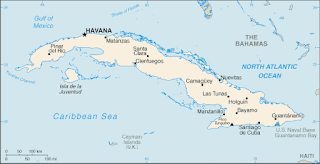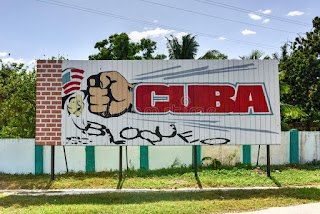Google Ads
Wednesday, May 31, 2023
Caricom has Failed in having the Cuban Embargo Lifted
Monday, March 20, 2023
U.S. Senators reintroduced bipartisan legislation to lift the Cuba trade embargo
U.S. Senators Klobuchar, Moran, Murphy, Marshall, Warren Introduce Bipartisan Legislation to Lift The Trade Embargo on Cuba
The Freedom to Export to Cuba Act would eliminate legal barriers preventing Americans from doing business in Cuba and create new economic opportunities by boosting U.S. exports and allowing Cubans greater access to American goods
WASHINGTON - U.S. Senators Amy Klobuchar (D-MN), Jerry Moran (R-KS), Chris Murphy (D-CT), Roger Marshall (R-KS), and Elizabeth Warren (D-MA) reintroduced bipartisan legislation to lift the Cuba trade embargo. The Freedom to Export to Cuba Act would eliminate legal barriers preventing Americans from doing business in Cuba and create new economic opportunities by boosting U.S. exports and allowing Cubans greater access to American goods. The legislation repeals key provisions of existing laws that block Americans from doing business in Cuba, but keeps in place laws that address human rights or property claims against the Cuban government.
“I have long pushed to reform our relationship with Cuba, which for decades has been defined by conflicts of the past instead of looking toward the future,” said Klobuchar. “By ending the trade embargo with Cuba once and for all, our bipartisan legislation will turn the page on the failed policy of isolation while creating a new export market and generating economic opportunities for American businesses.”
“The unilateral trade embargo on Cuba blocks our own farmers, ranchers and manufacturers from selling into a market only 90 miles from our shoreline, while foreign competitors benefit at our expense,” said Moran. “This legislation will expand market opportunities for U.S. producers by allowing them to compete on a level playing field with other countries. It is time to amend our own laws to give U.S. producers fair access to market to consumers in Cuba.”
“We can expand opportunities for American businesses and farmers to trade with Cuba while still holding the Cuban government accountable for its human rights record. This bipartisan legislation is a smart fix that will create American jobs and benefit the Cuban people,” said Murphy.
“I’m proud to sign onto the Freedom to Export to Cuba Act. It’s important for the United States to boost our economic opportunities and increase market access for American-made goods. Repealing the current legal restrictions and trade embargo on Cuba allows for Kansas farmers, ranchers and manufacturers to expand their businesses to Cuba and opens the door to a large export market, while leaving in place measures to address human rights abuses,” said Marshall.
“It is long past time for us to normalize relations with Cuba,” said Warren. “This legislation takes important steps to remove barriers for U.S. trade and relations between our two countries and moves us in the right direction by increasing economic opportunities for Americans and the Cuban people.”
The Freedom to Export to Cuba Act repeals the current legal restrictions against doing business with Cuba, including the original 1961 authorization for establishing the trade embargo; subsequent laws that required enforcement of the embargo; and other restrictive statutes that prohibit transactions between U.S.-owned or controlled firms and Cuba, and limitations on direct shipping between U.S. and Cuban ports.
Cuba relies on agricultural imports to feed the 11 million people who live there and the approximately 4 million tourists who visited in 2019 prior to the pandemic. The U.S. International Trade Commission found that if restrictions on trade with Cuba had been lifted, exports like wheat, rice, corn, and soybeans could increase by 166 percent within five years to a total of about $800 million.
Friday, February 4, 2022
The Cuban Revolutionary Government denounces the more than 60 years of the economic, commercial and financial blockade on Cuba - formally imposed by the U.S. on February 3, 1962
Sixty years ago today, a Presidential Proclamation formalized the criminal U.S. blockade against Cuba
....It is the practical expression of the Monroe Doctrine in the 21st century, which views Latin America and the Caribbean from the perspective of an owner, whether it be the "back or front yard."
Revolutionary Government Statement
Author: Granma | internet@granma.cu
The Revolutionary Government denounces the more than 60 years of the economic, commercial and financial blockade formally imposed by the U.S. on February 3, 1962. On this date, then President John F. Kennedy issued Proclamation 3447, which decreed a total "embargo" on trade with our country under section 620 (a) of the Foreign Assistance Act, thus formalizing the aggressive, unilateral economic actions taken against Cuba since the Revolution triumphed.The accumulated damages over these six decades have surpassed 144,413,400,000 dollars at current prices.During the pandemic, and throughout these 60 years, the blockade has had an incalculable human cost and several generations have felt it in the flesh.




